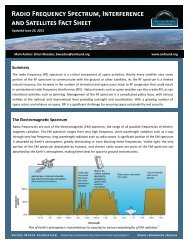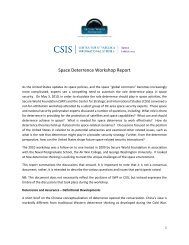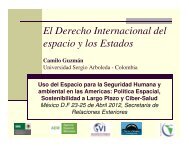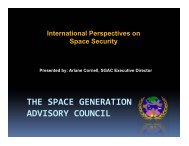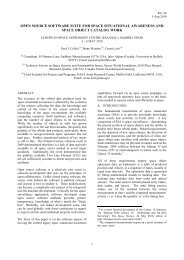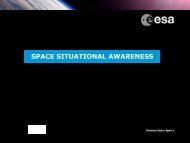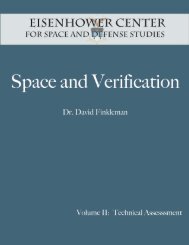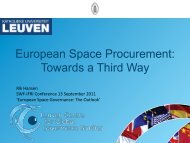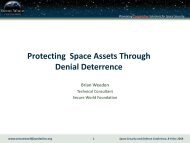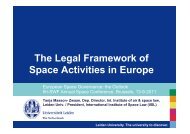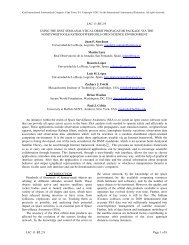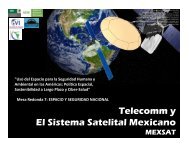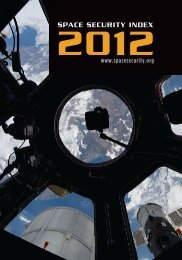Space Security Index
Space Security Index
Space Security Index
You also want an ePaper? Increase the reach of your titles
YUMPU automatically turns print PDFs into web optimized ePapers that Google loves.
<strong>Space</strong> <strong>Security</strong> 2011<br />
62<br />
Memorandum of Understanding establishing a Pre-<br />
and Post-Missile Launch Notification System (2000)*<br />
Strategic Arms Reduction Treaty –<br />
New START (2011)*<br />
* Indicates a bilateral treaty between U.S. and USSR/Russia<br />
† U.S. withdrew according to the terms of the treaty in 2002<br />
Exchange of information on missile launches<br />
Acceptance of and prohibition of interference with, national technical<br />
means of verification 36<br />
Other laws and regimes<br />
among participating states in the Missile Technology Control Regime (MTCR) adds another<br />
layer to the international regulatory framework for space-related activities. 37 e MTCR is a<br />
voluntary partnership among 34 states to apply common export control policy on an agreed<br />
list of technologies, such as launch vehicles that could also be used for missile deployment. 38<br />
Specically, the MTCR seeks to prevent the proliferation of missile and unmanned aerial<br />
vehicle technology that would be used to carry payloads weighing 500 kg for 300 km or<br />
more, as well as systems that could be used to deliver weapons of mass destruction. 39<br />
Another related eort is the International Code of Conduct against Ballistic Missile<br />
Proliferation (Hague Code of Conduct), which calls for greater restraint in developing,<br />
testing, using, and proliferating ballistic missiles. 40 To increase transparency and reduce<br />
mistrust among subscribing states, it introduces condence-building measures such as the<br />
obligation to announce missile launches in advance.<br />
Treaties that have an impact on space during times of armed conict include the body of<br />
international humanitarian law composed primarily of the Hague and Geneva Conventions<br />
— also known as the Laws of Armed Conict. rough the concepts of proportionality and<br />
distinction, they restrict the application of military force to legitimate military targets and<br />
establish that the harm to civilian populations and objects resulting from specic weapons<br />
and means of warfare should not be greater than that required to achieve legitimate military<br />
objectives. 41 However, it is not clear how these laws apply to spacecraft and other space<br />
objects.<br />
e emergence of space commerce and the potential for space tourism has led at least 20<br />
states to develop national laws to regulate these space activities in accordance with the OST,<br />
which establishes state responsibility for the activities of national and nongovernmental<br />
entities. 42 While the proliferation of national legislation may increase compliance with<br />
international obligations and reinforce responsible use of space, in practice it has occasionally<br />
led to divergent interpretations of treaties. 43<br />
e ird United Nations Conference on the Exploration and Peaceful Uses of Outer <strong>Space</strong><br />
(UNISPACE III), held in 1999, adopted the Vienna Declaration on <strong>Space</strong> and Human<br />
Development. It established an action plan calling for the use of space applications for<br />
environmental protection, resource management, human security, and development and<br />
welfare. e Vienna Declaration also called for increasing space access for developing<br />
countries and the promotion of international space cooperation. 44 A concrete outcome of<br />
UNISPACE III is the United Nations Platform for <strong>Space</strong>-based Information for Disaster<br />
Management and Emergency Response (UN-SPIDER), adopted by the UNGA under<br />
Resolution 61/110 on 14 December 2006. It is the rst program aimed specically at<br />
ensuring access to and use of space-based information for all countries and organizations<br />
during all phases of a disaster.



